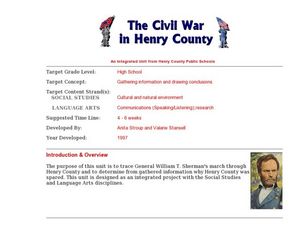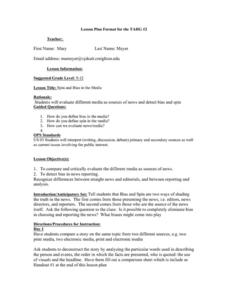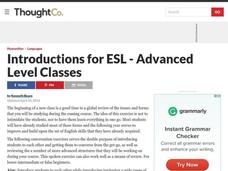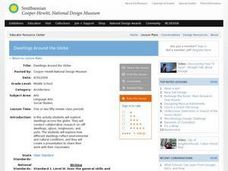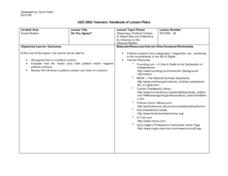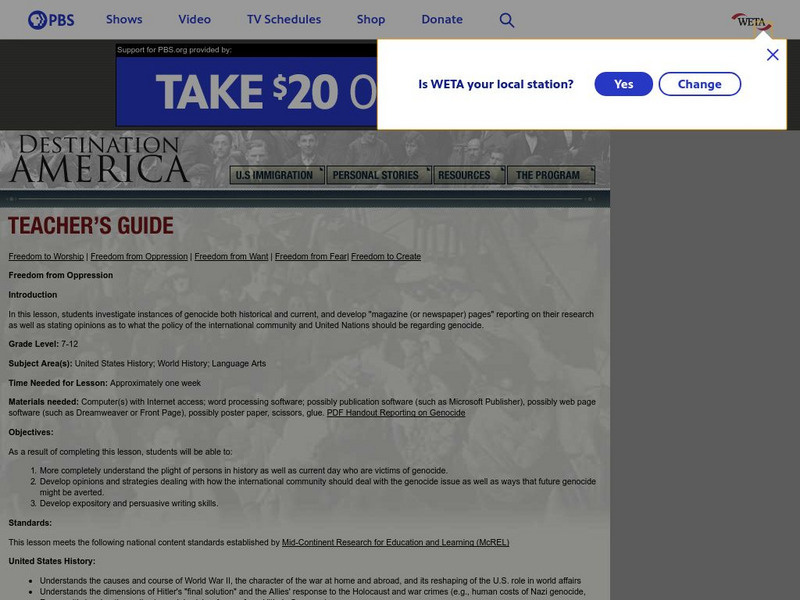Curated OER
- Making Metaphors with Munchies
Students brainstorm independently first, then ask their best friend on the team, or seat partners, depending on the year & student mix, to add to their list of personal characteristics and/or to name three words they think of...
Curated OER
New York City Delights: The Taxi Cab
You set the rate! Step into the shoes of a taxi driver in New York City, and also pretend to be a person who uses taxis to get around town. The class will conduct collaborative research to learn about the history of taxis. Then, they...
Curated OER
The Civil War in Henry County
Students consider how the Civil War impacted their community. In this Civil War lesson, students use primary and secondary sources to research the Civil War in Henry County, Georgia. Students use their findings to create multimedia...
Curated OER
Design Explorations: Frieze Patterns
Learners will explore frieze patterns. A frieze pattern is a mathematical concept to classify designs on two-dimensional surfaces, which are repetitive in one direction, based on the symmetries in the pattern. They will explore examples...
Curated OER
Baseball Statistics
Students read "Casey at the Bat" and then use individual player statistics (found through internet research)to determine if their players could be considered baseball "heroes". They must justify their choices for "hero" by creating...
Curated OER
Spin and Bias in the Media
High schoolers compare different types of media. In this media comparison lesson plan, students will assess the where all types of media gets its information by viewing a video of a news story and critiquing it.
Curated OER
Islamic Art
Learners examine the various forms of Islamic Art. Using the art, they identify the basic elements and research its history and style of calligraphy. They create a piece of art based on information they collected and demonstrate...
Curated OER
Introductory Lesson for Advanced Level Classes
Students participate in conversation exercises to introduce themselves and to review verb tenses. They interview each other and share conversations.
Curated OER
Countable and Uncountable Nouns - Noun Quantifiers
Students solidify their knowledge of countable and uncountable nouns and their quantifiers. The lesson includes a number of overlooked or idiomatic expressions to help higher level students expand their knowledge.
Curated OER
Vocabulary Charts
Students create their own vocabulary charts. They divide into groups and view an example of a vocabulary chart imbedded in this plan. Then, they create their own chart which is based on a particular subject area.
Curated OER
Objective Versus Subjective
Students examine the difference between subjective and objective statements, newscasts, and media. They discover that subjective is opinion based and objective is fact based.
Curated OER
Dwellings Around the Globe
Young scholars explore dwellings around the globe and conduct collaborative research on cliff dwellings, igloos, longhouses, and yurts. They then explore how different dwellings reflect environmental and cultural conditions, and they...
Curated OER
Subject and Object Questions
Students gain practice asking direct questions. They recognize the difference between subject and object questions. After a lecture/demo, students work in small groups and use a worksheet imbedded in this plan to gain practice.
Curated OER
Minimal Pair Pronunciation Lesson
Students distinguish minor differences between English vowel sounds.
Curated OER
Do You Agree?
Students recognize bias in a political cartoon, evaluate how the media uses both positive and/or negative political cartoons, and assess the influence a political cartoon can have on a person.
Curated OER
Poetry
Students apply reading comprehension skills to poetry and synthesize the information to create a new piece of work.
Curated OER
Pronunciation: Practicing Stress and Intonation
Middle schoolers practice pronunciation of their words and when to stress certain words when speaking. They practice with sentences given to them by the teacher.
Curated OER
What's Wrong - Intensive Reading
Students discuss the different types of reading and when to use each type. They read passages and try to find the mistake in each sentence.
Curated OER
Speech: Skill, Process, Practice
Learners examine the characteristics of an informative speech. In this informative speech lesson plan, students create a framework for their informative speech using the given website. Learners also read and use the tips for preparing...
Curated OER
Subsidence/ Erosion
Students utilize prior knowledge about the Pontchartrain Basin. In this subsidence/erosion lesson, students study the chart on land subsidence and must them identify and find solution for problems caused by erosion.
Curated OER
What Did You Say?
Twelfth graders identify main ideas in reading selections. They read newspaper letters to the editor, identify the main ideas, list the supporting details, and present each side of the issue to the class.
PBS
Pbs Teachers: Freedom From Oppression (Editorial Writing Lesson Plan)
A lesson plan designed to investigate instances of genocide both historical and recent. Directs students to take on roles as members of the press and create editorials that describe genocidal tragedies and that also outline steps...




